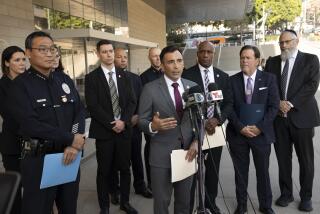Stories, issues in shooting aftermath
- Share via
Re “Shooter plotted in silent rage,” April 18
My heart broke to hear about the murders at Virginia Tech. Even though I was only 10 when the Columbine shootings occurred, I feel the same emotions now as I did then. I cannot help but wonder: When will we all learn? Seung-hui Cho was mad at the world; why couldn’t someone have reached out and befriended him? So many people are hurting and just need someone to show them that life and love are valuable and worth pursuing.
SARAH ROBERTS
Chino Hills
*
Confidentiality laws covering students as young as 18 -- so highly enforced at our colleges and universities -- have precluded parents from knowing when their children are experiencing significant medical, behavioral or emotional challenges. Most of these students are financially dependent on their parents, and in nearly all cases their parents would obtain whatever treatment was necessary if they were notified there was a need. By all accounts, the Cho family was dedicated to providing every opportunity for their son to succeed and would have intervened to obtain more intensive treatment had they simply been notified. Confidentiality rights of students not deemed independent by the federal student financial aid guidelines (age 25) should be revisited.
JANET CAMPBELL
Glendora
*
Re “Rising fears of ethnic backlash,” April 18
I hope that there is not a backlash against Koreans in this country because of the Virginia Tech shootings. This tragedy was committed by a disturbed young man; his ethnicity had nothing to do with it. I hope that, in this country, we have been able to put aside the ethnic background of a person and see each individual as a human being and not a member of an ethnic group.
KATHERINE MINSK
Long Beach
*
Re “Gun control back as a campaign issue,” April 18
The greater tragedy in this event is our blatant unwillingness to address gun violence in our country. Why are we obsessed with the university’s response time? The real problem is not how efficiently we react to acts of murder but whether we will marshal the strength to prevent it.
SANDRA HARPER
Los Angeles
*
In 2002, there was a shooting at the Appalachian School of Law. Someone opened fire, but the difference was that an off-duty police officer went and got his gun and subdued the shooter. If only someone at Virginia Tech had been able to take out the shooter. But Virginia Tech is a gun-free zone. The criminals can get guns; the lawful among us need guns for defense. Gun control keeps guns away from people who obey the laws and need a gun for self-defense. What needs to be understood is: No defense is a lousy defense.
JUDY HERBST
Beverly Hills
*
Re “Holocaust survivor gave his life to save students,” April 18
While reading the personal profiles of some who died at Virginia Tech, one in particular stood out: Liviu Librescu. He was born in Romania and survived the Holocaust, then emigrated to Israel in 1978 before moving to Virginia in 1985. Internationally known for his work in aeronautical engineering, he was a lecturer in engineering and mechanics at Virginia Tech. Librescu physically blocked the doorway against the gunman while shouting for students to flee to safety. Reading of Librescu’s heroism, it immediately came to mind how often I have heard men and women of my parents’ generation agonize over why they were spared during the Holocaust while others were not. At least one reason why he survived while others did not: Librescu was there to call on his strength to save these young men and women of another generation. Now these students will tell the story of a brave man who gave them an opportunity to live in the world with courage and strength matching his own.
CLAUDIA PARRAS
Lakewood
More to Read
Sign up for Essential California
The most important California stories and recommendations in your inbox every morning.
You may occasionally receive promotional content from the Los Angeles Times.













